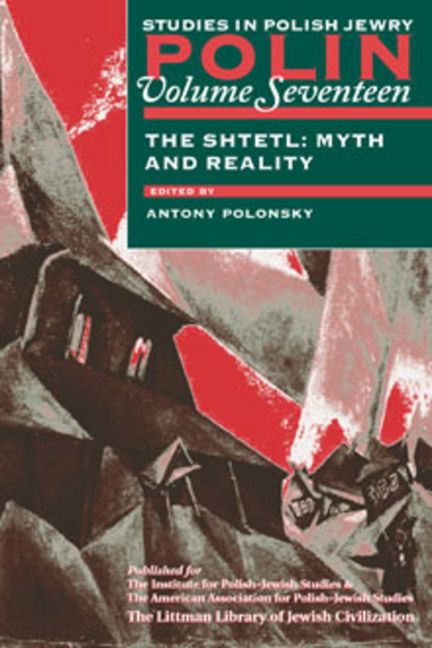Book contents
- Frontmatter
- Dedication
- Editors and Advisers
- Preface
- Polin
- Polin: Studies inPolish Jewry
- Contents
- Note on Place Names
- Note on Transliteration
- List of Abbreviations
- PART I THE SHTETL: MYTH AND REALITY
- PART II NEW VIEWS
- PART III DOCUMENTS
- Gomułka Writes to Stalin in 1948
- PART IV THE SIXTY-FIFTH ANNIVERSARY OF EVENTS IN PRZYTYK: A DEBATE
- PART V REVIEWS
- OBITUARIES
- Notes on the Contributors
- Glossary
- Index
Gomułka Writes to Stalin in 1948
from PART III - DOCUMENTS
- Frontmatter
- Dedication
- Editors and Advisers
- Preface
- Polin
- Polin: Studies inPolish Jewry
- Contents
- Note on Place Names
- Note on Transliteration
- List of Abbreviations
- PART I THE SHTETL: MYTH AND REALITY
- PART II NEW VIEWS
- PART III DOCUMENTS
- Gomułka Writes to Stalin in 1948
- PART IV THE SIXTY-FIFTH ANNIVERSARY OF EVENTS IN PRZYTYK: A DEBATE
- PART V REVIEWS
- OBITUARIES
- Notes on the Contributors
- Glossary
- Index
Summary
INTRODUCTION
CURRENTLY, even an exhaustive probe into the purge of east European Communists during the final years of Stalin's rule cannot be conclusive. Many primary records are still inaccessible to independent scholars, but even unlimited access to the archives may prove to be inadequate. It is unlikely that the guardians of ideology and security in eastern Europe have preserved all of the relevant documents on the show trials of party activists, who were in fact dedicated to the victory of Communism in their respective countries. The most revealing and substantial documents, moreover, are located in Moscow and continue to be closely guarded.
Although the purges of loyal east European Communists in 1948–56 were instigated and meticulously planned in Moscow, local party and security officials carried them out and put their own unique stamp on the process. The exact role of the Soviet security and counter-intelligence advisers in the region remains shrouded in mystery. In the late stages of Stalin's rule, power was shifted to the vast apparatus of terror and repression, if only to mobilize eastern Europe for the coming Stalinist revolution. The east European show trials that followed were triggered by the internal logic of Stalinism, or what Zbigniew Brzezinski once called the totalitarian politics of the ‘permanent purge’.
The purges were of course preceded by the onset of the cold war in Europe and Asia, the Soviet–Yugoslav split, and Stalin's personal obsession with anti-Jewish conspiracies (which only increased after the founding of the state of Israel in May 1948). They culminated in the infamous ‘Jewish doctors’ plot’ of January 1953, in which a group of doctors in Moscow, most of them Jewish, were alleged to have conspired to murder leading Soviet political and military figures by sabotaging their medical treatment. The Kremlin's goal in instigating the purges was to establish complete dominion over its European satellites. In this respect, the causes of the purges were in large measure identical throughout the region, as were the methods employed during the campaign of terror.
- Type
- Chapter
- Information
- The Shtetl: Myth and Reality , pp. 365 - 382Publisher: Liverpool University PressPrint publication year: 2004

